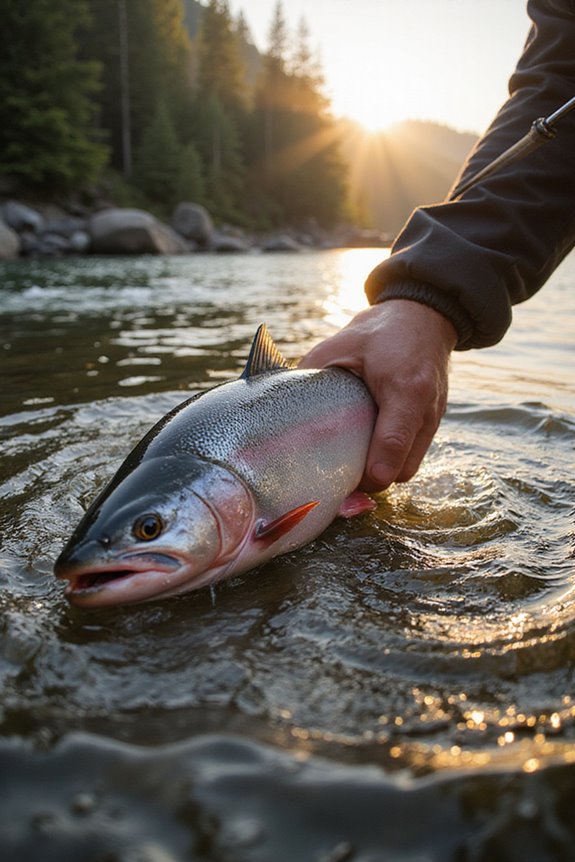Salmon is a fantastic choice for weight loss because it’s high in protein and omega-3 fatty acids, which support metabolism and appetite control. A 3.5-ounce serving can have as little as 180 calories, helping you stay satiated. When paired with fiber-rich vegetables, it enhances fullness even more. Plus, regular consumption promotes heart health and reduces cholesterol levels. If you’re interested in learning more about how to incorporate salmon into your diet effectively, there’s plenty of valuable information ahead.
Key Takeaways
- Salmon is low in calories and high in protein, promoting fullness and aiding weight loss efforts.
- Omega-3 fatty acids in salmon improve metabolic efficiency, enhancing fat burning and weight management.
- Regular consumption of salmon helps regulate appetite and reduces hunger hormones, supporting weight control.
- Cooking methods like grilling or baking retain nutrients, making salmon a healthy addition to meals.
- Incorporating salmon into a balanced diet contributes to overall well-being and may reduce chronic disease risk.
Nutritional Profile of Salmon
Salmon boasts an impressive nutritional profile that makes it a popular choice for those looking to maintain a healthy diet, especially for weight loss. A 3.5-ounce serving of wild salmon typically has around 180 calories, with slightly more protein than farmed salmon, which averages 206 calories for the same serving size. Wild salmon contains about 22-25 grams of protein, while farmed has higher fat content, up to 12 grams. Both types are rich in omega-3 fatty acids, but wild salmon is often considered better for salmon sustainability. The vitamins found in salmon, like B12 and D, support various bodily functions. Choosing between wild vs. farmed can depend on dietary goals and environmental concerns. Much like the low visibility properties of fluorocarbon fishing lines make them ideal for catching fish, salmon’s nutrient density makes it nearly invisible to your weight loss goals.
The Role of Protein in Weight Management

When considering weight management, the role of protein becomes increasingly important. Protein sources, like salmon, considerably impact appetite regulation. Higher dietary protein increases hormones that promote fullness while reducing hunger hormones, helping me feel satisfied longer. This means I’m less likely to overeat. Additionally, a high-protein diet boosts thermogenesis, meaning my body burns more calories just digesting the protein compared to fats or carbs. Preserving lean body mass is another benefit, as maintaining muscle supports a healthier metabolism during weight loss. By choosing protein-rich foods, I stabilize my energy levels and keep cravings at bay. Much like the efficient drag systems in quality fly fishing reels ensure smooth fish retrieval, efficient protein metabolism ensures smooth weight management. Overall, incorporating quality protein sources into my dietary patterns enhances my weight management efforts, making it a smart choice for anyone looking to shed pounds.
Omega-3 Fatty Acids and Their Impact on Metabolism

Omega-3 fatty acids play a significant role in enhancing metabolism, especially for those of us focused on weight management. The omega 3 benefits include improved metabolic efficiency, which can aid in weight loss. These fatty acids, particularly EPA and DHA from fish sources, boost muscle metabolism and promote energy expenditure during physical activities. For example, after twelve weeks of fish oil supplementation, I observed up to a 14% increase in resting metabolic rate. Additionally, omega-3s improve insulin sensitivity, making it easier for our bodies to utilize glucose effectively. By incorporating salmon into my diet, I’m not just enjoying a tasty meal; I’m also supporting my body’s ability to maintain muscle mass and enhance overall metabolic health. When fishing for salmon, consider using biodegradable fishing lines to reduce environmental impact while still enjoying the nutritional benefits of this omega-3 rich fish.
Salmon and Appetite Control

Eating salmon not only provides valuable omega-3 fatty acids for metabolic support but also plays a significant role in appetite control. The high protein content in salmon, with around 19 grams per 3-ounce serving, aids appetite suppression by promoting feelings of fullness. When I include salmon in my meals, I notice reduced hunger, especially during late-night hours. Pairing salmon with fiber-rich vegetables enhances satiety, helping me avoid unnecessary snacking. Additionally, the anti-inflammatory properties of salmon support gut health, which regulates appetite hormones like ghrelin and leptin. By incorporating salmon regularly, I find it easier to maintain a balanced appetite, making it a key player in my weight management strategy. The salmon benefits extend beyond nutrition to effective appetite control.
Effects on Body Composition and Fat Reduction

Understanding the effects of salmon on body composition and fat reduction is essential for anyone looking to optimize their weight management strategies. Salmon’s unique composition, especially its fatty acids, plays a significant role in fat metabolism. Farmed salmon often contains higher body fat due to their diet, which can impact how our bodies process these fats. When selecting salmon, consider wild-caught options for a leaner protein source. Seasonal variations also affect salmon’s fat and protein levels, suggesting that consuming it during specific times may enhance fat reduction. Incorporating salmon into a balanced diet, while monitoring portion sizes and pairing it with physical activity, can effectively support your fat reduction goals.
Cardiometabolic Health Benefits of Salmon
Salmon plays a significant role in promoting cardiometabolic health, making it a valuable addition to any diet aimed at improving heart and metabolic function. The unique compounds in salmon, particularly salmon peptides, have been shown to positively influence cardiometabolic indicators. Research indicates that regular consumption, like two servings a week, can lead to lower total cholesterol and reduced levels of low-density lipoprotein (LDL) cholesterol. Additionally, salmon’s high omega-3 fatty acid content supports anti-inflammatory effects that protect the heart. The specific bioactive pathways targeted by salmon peptides may help manage metabolic dysfunction. Incorporating salmon into my meals not only supports my overall health but also enhances my heart health, making it a practical choice for anyone looking to improve their diet.
Integrating Salmon Into Your Diet
When considering how to incorporate salmon into my diet, it’s important to focus on practical methods that enhance both flavor and nutritional value. I aim to include salmon recipes in my meal planning at least 2-3 times a week. A 3-ounce serving provides about 19 grams of protein, making it a satisfying choice. I often grill or bake salmon, pairing it with colorful vegetables and whole grains to create balanced meals. This approach not only helps control calories but also boosts nutrient intake. I like to replace red meat with salmon, as it reduces saturated fat. Rotating salmon with other lean proteins, like turkey or plant-based options, keeps my meals exciting and supports my weight loss goals effectively.
Versatility and Preparation Methods
Exploring different preparation methods for salmon not only enhances its flavor but also makes it easier to fit into a weight loss plan. I often use various cooking techniques like baking, grilling, and poaching. For baking, I wrap the salmon in foil with lemon slices to keep it moist and flavorful. Grilling gives a nice char, while pan-searing creates a crispy texture without excessive oil. Pairing salmon with leafy greens, legumes, or citrus elevates the dish and boosts fiber intake. I find that herbs like dill and oregano enhance flavor combinations without adding calories. These methods not only preserve essential omega-3 fats but also keep meals exciting and satisfying, making it easier to stick to a healthy eating regimen.
Long-Term Weight Loss Strategies With Salmon
Incorporating salmon into a long-term weight loss strategy can be highly effective, especially when you focus on its nutritional benefits. Meal planning is essential; I recommend including salmon two to three times a week. This helps me control portions, as a 3-ounce serving packs about 19 grams of protein, promoting satiety and reducing cravings for unhealthy snacks. Salmon’s omega-3 fatty acids support metabolic health and aid fat oxidation, enhancing my weight loss efforts. I find that preparing salmon in various ways—grilling, baking, or pan-searing—keeps meals interesting while providing essential nutrients. By integrating salmon into my diet, I’m able to maintain energy levels and support muscle preservation, which are vital for my long-term weight management goals.
Frequently Asked Questions
Can Salmon Help With Muscle Recovery After Workouts?
I know some might think salmon’s just another fish, but its omega benefits really shine for muscle recovery. I’ve noticed improved protein synthesis and reduced soreness after workouts, making salmon a go-to for my post-exercise meals.
Is It Safe to Eat Salmon Daily?
I think daily consumption of salmon can be safe, but it’s important to watch for health risks like mercury exposure and calorie surplus. Moderation is key, and variety in my diet helps maintain balance.
What Are the Best Cooking Methods for Salmon?
Oh, the great salmon showdown! I’d say mastering grilling techniques for that perfect char is a must, but don’t overlook baking options—set it and forget it! Both methods make salmon deliciously irresistible.
How Does Salmon Compare to Other Fish for Weight Loss?
When I compare salmon nutrition to other fish, I find it offers a balance of healthy fats and proteins. While it’s not the leanest option, its benefits still make it a valuable part of my diet.
Can Salmon Be Part of a Vegetarian Diet?
I believe salmon can’t fit into a strict vegetarian diet, but for pescatarians, it’s a great source of vegetarian protein. However, I often explore salmon alternatives to enjoy similar benefits while staying meat-free.





